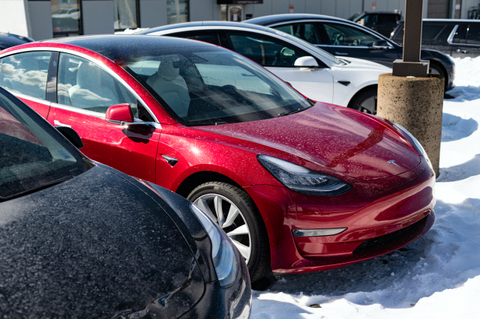Driving Tips for Navigating Winter in Your EV
This article may contain affiliate links.
With the busy holiday season and longer nights, winter brings a higher risk of accidents. Weather conditions can be treacherous, with snow and ice making driving much more difficult.
Navigating the roads can be challenging when driving an electric vehicle (EV)—especially for new owners. Remember these five points when driving your EV on a snowy road.
Keep the Car Warm
EV drivers should remember to keep their cars warm before hitting the road. Most vehicles need to warm up to help the engine and transmission get the fluids running correctly. Similar protocols apply to EVs.
Battery-powered vehicles must stay warm because colder temperatures force them to work harder. You can grab a battery snow shovel in the winter months and make sure that snow doesn’t pile up around the wheels and motor. Not only will this cause it to get cold and damage the electrics, but the salt and grit in the snow can damage your vehicle. Starting your EV in the morning when temperatures are still frigid means the battery works hard to warm up.
The car drains energy so there’s less available for the drive. Charging an EV should be a high priority in the winter. Drivers should clean snow and ice off their vehicles or keep them inside a climate-controlled garage.
Prep Yourself and Your EV
Another tip before hitting the road is to prepare yourself and the car. Start by checking the road conditions, whether by local media, the National Weather Service or your own eyes. You can also precondition your EV by warming it up while it’s plugged in and charging.
This method saves time and conserves the energy you need when driving.
Maintain a Steady Speed
Drivers should exercise even more caution than usual when frigid conditions hit. Snow and ice can decrease traction, increasing the likelihood of accidents. The best advice EV operators can take is to drive slower. The reduction in grip means braking and turning are more difficult than in the summer. One aggressive move can send the car spinning.
Driving at a steady speed in the winter is critical in an EV because the battery again comes into play. It works harder to warm up in cold conditions and has to do the same when driving. Higher speeds mean limiting the range of your EV and could lead to troubles down the road. The last thing you want is to get stuck in the snow in unfamiliar territory.
Get a Heat Pump
EV drivers can help their cars by using a heat pump, which replaces the conventional air conditioning (AC) system and consumes less power. They’ve been around since 2013 and can significantly benefit these vehicles.
Heat pumps use a refrigerant circuit and absorb heat from the atmosphere to blow inside the cabin. These devices can extend the range of EVs in the winter while keeping drivers and passengers warm.
Install Winter Tires
One downfall of EVs is their weight. The battery of this heavy machinery adds more pounds to the vehicle, thus further reducing the grip. This factor can be detrimental in snowy weather, and one way to alleviate this concern is to get winter tires.
All-season versions can work, but winter tires have a softer compound that drives well on slippery roads. Using them means there’s less chance of spinning out.
Driving Safely in the Snow
EVs symbolize sustainability in travel. In the winter, you should take extra steps to ensure you’re driving safely in one of these vehicles. Remember these five points before dashing through the snow.
Some EVs Worth a Fling in the Snow
Road Test: 2022 Ford F-150 Lightning EV
Flash Drive: 2023 Volkswagen ID4 AWD
News: 2024 Chevrolet Equiinox EV
The post 5 Points to Remember When Driving Your EV in Snow first appeared on Clean Fleet Report.







